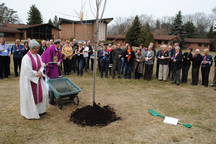And it’s all about commonplace leftist preoccupations that have little to do with Christianity – like resource extraction – and diminishing membership; could there be connection?
From here:
Hundreds of members of the Anglican Church of Canada and the Evangelical Lutheran Church in Canada are converging on Ottawa for an unprecedented joint national gathering of the two churches, where they will tackle issues like resource extraction, homelessness, and how to live out their mission in a time of diminishing church membership.
The Anglican Church of Canada is claiming “545,000 members”, a grossly inflated number I suspect. After all, my wife and I are still on the membership roll of the Diocese of Niagara even after the bishop sued me. I wonder if that’s a first, a bishop suing one of his own parishioners?
The Anglican Church of Canada (anglican.ca) has been a self-governing member of the worldwide Anglican Communion since 1893 and has 545,000 members in nearly 2,800 congregations across the country.
The ELCIC claims even fewer members – 145,000 – and has joined with the ACoC in the hope, perhaps, of padding its denomination with disaffected Anglicans; another example of resource extraction.
The Evangelical Lutheran Church in Canada (elcic.ca), established in 1986, has 145,000 members across Canada in nearly 600 congregations and is a member of the Lutheran World Federation.
Membership decline is to be addressed by restructuring rather than examining the reason that people are leaving:
Delegates from both churches will also discuss proposals to restructure the way in which the Anglican Church of Canada and the Evangelical Lutheran Church in Canada function, since both churches have experienced the same decline in membership as many other mainline Canadian churches.
Not all mainline churches have lost members: the Roman Catholic Church has experienced membership growth while standing resolutely against same-sex marriage, abortion and euthanasia – could there be a connection?
Like this:
Like Loading...


 have been hurtling pell-mell down the road of increasing theological liberalism and both have been suffering equally catastrophic numbers of people fleeing their churches for less “inclusive” pastures.
have been hurtling pell-mell down the road of increasing theological liberalism and both have been suffering equally catastrophic numbers of people fleeing their churches for less “inclusive” pastures.